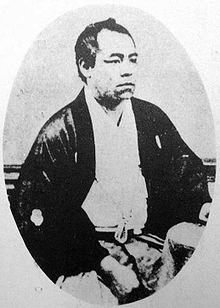Gotō Shōjirō
| Gotō Shōjirō | |
|---|---|

Count Gotō Shōjirō
|
|
| Born |
April 13, 1838 Kōchi Prefecture, Japan |
| Died | August 4, 1897 (aged 59) Hakone, Kanagawa, Japan |
| Nationality | Japanese |
| Occupation | Politician, Cabinet Minister |
Count Gotō Shōjirō (後藤 象二郎?, April 13, 1838 – August 4, 1897) was a Japanese samurai and politician during the Bakumatsu and early Meiji period of Japanese history. He was a leader of Freedom and People's Rights Movement (自由民権運動 jiyū minken undō?) which would evolve into a political party.
Gotō was born in Tosa Domain (present day Kōchi Prefecture). Together with fellow Tosa samurai Sakamoto Ryōma, he was attracted by the radical pro-Imperial Sonnō jōi movement. After being promoted, he essentially seized power within the Tosa Domain's politics and exerted influence on Tosa daimyō Yamauchi Toyoshige to call on Shogun Tokugawa Yoshinobu to return power peacefully to the Emperor.
After the Meiji Restoration, Gotō was appointed to a number of posts, including that of Governor of Osaka, and sangi (councillor), but later from the Meiji government in 1873 over disagreement with the government's policy of restraint toward Korea (i.e. the Seikanron debate) and, more generally, in opposition to the Chōshū-Satsuma domination of the new government. Jointly with Itagaki Taisuke, he submitted a memorandum calling for the establishment of a popularly elected parliament. In 1874, together with Itagaki Taisuke, and Etō Shimpei and Soejima Taneomi of Hizen Province, he formed the Aikoku Kōtō (Public Party of Patriots), declaring, "We, the thirty millions of people in Japan are all equally endowed with certain definite rights, among which are those of enjoying and defending life and liberty, acquiring and possessing property, and obtaining a livelihood and pursuing happiness. These rights are by Nature bestowed upon all men, and, therefore, cannot be taken away by the power of any man." This anti-government stance appealed to the discontented remnants of the samurai class and the rural aristocracy (who resented centralized taxation) and peasants (who were discontented with high prices and low wages).
...
Wikipedia
